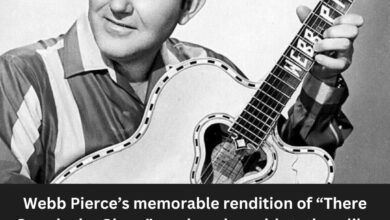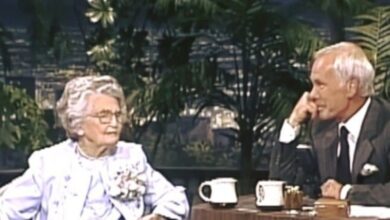Lynn Anderson’s ‘(I Never Promised You a) Rose Garden’ Blossoms into a 1970 Cross-Genre Sensation
In late 1970, country music witnessed a transformative moment with the release of Lynn Anderson’s “(I Never Promised You a) Rose Garden.” This track not only dominated the country charts but also made significant inroads into the pop music scene, showcasing the potential for crossover appeal in the genre. Its success was emblematic of a shifting musical landscape, where boundaries between genres became increasingly fluid.
Lynn Anderson, born in Grand Forks, North Dakota, in 1947, was immersed in music from an early age, influenced by her mother, Liz Anderson, a notable country songwriter. Lynn’s early career saw her performing on regional television in California, which eventually led to a contract with Chart Records in 1966. Her vibrant stage presence and distinct vocal style quickly set her apart, earning her a spot on “The Lawrence Welk Show,” where she introduced country music to a broader audience.
The journey of “Rose Garden” began with songwriter Joe South, who penned the song in 1967. Despite its initial recordings by artists like Billy Joe Royal and Dobie Gray, the song didn’t achieve significant success until Anderson’s rendition. Anderson was captivated by South’s version and was determined to record it. However, her producer and then-husband, Glenn Sutton, was initially hesitant, believing the song’s lyrics, particularly lines like “I could promise you things like big diamond rings,” were more suited for a male vocalist. Anderson’s persistence eventually won him over, leading to the iconic recording session.
The recording session took place in August 1970 at Columbia Recording Studio in Nashville. Under Sutton’s production, the track was infused with a blend of traditional country instrumentation and lush string arrangements, a hallmark of the “countrypolitan” sound that aimed to attract both country and pop audiences. The addition of a mandolin and a full string section provided a rich backdrop to Anderson’s compelling vocals, creating a sound that was both contemporary and timeless.
Upon its release in October 1970, “Rose Garden” received an overwhelming response. It soared to the number one spot on the Billboard Hot Country Singles chart, maintaining its position for five consecutive weeks. The song also achieved crossover success, peaking at number three on the Billboard Hot 100 and charting in the top five in numerous countries worldwide. Its widespread acclaim was further solidified when Anderson won the Grammy Award for Best Female Country Vocal Performance in 1971.
The cultural impact of “Rose Garden” was profound. Released during a period of social and political upheaval, the song’s themes of resilience and acceptance resonated with a wide audience. Anderson herself noted that its popularity was partly due to its timely message, as it emerged just as the nation was recovering from the Vietnam War, offering a sense of hope and understanding.
For Anderson, the success of “Rose Garden” was a career-defining moment. It catapulted her into international stardom, leading to appearances on major television shows and opening doors to venues that were previously inaccessible to country artists. The song’s popularity also paved the way for her subsequent hits, solidifying her status as a leading figure in country music throughout the 1970s.
The influence of “Rose Garden” extended beyond Anderson’s career, impacting the broader country music genre. Its crossover success demonstrated the commercial viability of country-pop fusion, inspiring other artists to explore and blend genres. This trend contributed to the evolution of country music, making it more accessible to diverse audiences.
The song’s enduring appeal is evident in the numerous covers and renditions by artists across various genres. Notably, k.d. lang’s 1987 version introduced the song to a new generation, while Martina McBride’s 2005 rendition brought it back to the country charts, highlighting its timeless quality and universal message.
During the height of “Rose Garden’s” success, Anderson experienced both professional highs and personal challenges. Her demanding schedule led to strains in her personal life, including her marriage to Glenn Sutton, which eventually ended in divorce. Despite these challenges, Anderson continued to produce music and perform, showcasing her resilience and dedication to her craft.
Decades after its release, “Rose Garden” remains a staple in both country and pop music repertoires. Its continued radio play, inclusion in various “greatest songs” lists, and its influence on artists across genres underscore its lasting legacy. The song’s message continues to resonate, reminding listeners of the balance between joy and hardship in life.
The success of “Rose Garden” also had a lasting impact on music production and marketing strategies. It highlighted the potential of crossover hits, encouraging producers and artists to create music that could appeal to multiple audiences. This approach has since become a common strategy in the music industry, influencing how music is produced and promoted.
In recognition of her contributions to music, Anderson received numerous accolades throughout her career. Beyond her Grammy win for “Rose Garden,” she was honored with awards from the Academy of Country Music and the Country Music Association. Her influence is also evident in the artists she inspired, many of whom cite her as a trailblazer who broadened the horizons of country music.
Reflecting on “(I Never Promised You a) Rose Garden,” it’s clear that its success was not merely a product of its time but a testament to its universal themes and musical innovation. The song encapsulates a blend of heartfelt lyrics, memorable melodies, and a performance that transcends genre boundaries. Lynn Anderson’s rendition remains a landmark achievement, symbolizing the transformative power of music to bridge divides and resonate across generations.



